Share This:
March 31, 2013 | Theatre,
CHECK OUT THESE FILMS, BOOKS & MUSIC RELATED TO NEVA
FILMS
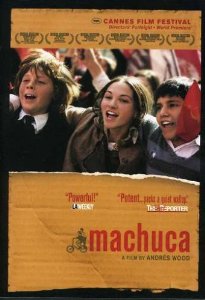 Machuca (2004)
Machuca (2004)
Revolution and change are in the air when Chile elects Socialist President Salvador Allende in 1973. He brings forth ideals of bridging the gap between the rich and poor into the social consciousness, but these ideals crumble, giving way to a tense military coup. Meanwhile, the friendship between two adolescents—the slum-raised Pedro Machuca and the well-off Gonzalo Infante—is tested as their compatriots fiercely defend their economically polarized society. Echoing the Tsarist regime causing terror amongst its citizens in Neva, Machuca ruthlessly examines how political turmoil is only resolved at high costs. See Machuca in the Bright Family Screening Room on April 5 @ 9PM.
Swimming to Cambodia (1987)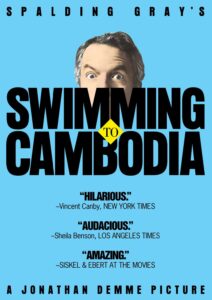
What roles do theatre and the arts play in revolution? Actor and writer Spalding Gray finds out during his harrowing experience of filming on location in Cambodia. History resonates around the Killing Fields, sites of the genocide by the Khemer Rouge during the Cambodian Revolution. Expert storyteller Gray recounts his riveting experiences and reflects on the power of art to bring about social change. Check it out in the Bright Family Screening Room on April 13 @ 6PM.
 The Battle of Algiers (1967)
The Battle of Algiers (1967)
Revolution is in the air with bloody battles of Algerians pitted against their French rulers in 1960. This film uses documentary filming techniques to portray each viewpoint of the struggle, with shootings, terrorist plots and riots raging on both sides. With an ambivalent moral standing towards this act of independence—resistance fighters use torture and French leaders bomb innocent citizens—The Battle of Algiers provides a brutally honest representation of the kinds of warfare necessary to gain freedom. Check out this film in the Bright Family Screening Room on April 6 @ 6PM.
BOOKS
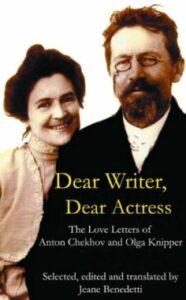 Dear Writer, Dear Actress (2007)
Dear Writer, Dear Actress (2007)
Glimpse the love shared between Anton Chekhov and Olga Knipper through their letters to one another as they transitioned from friendship to matrimony. Despite often being separated by work and illness, their relationship remained strong. With Chekhov’s prolific writing career and Knipper’s acting success, the two were great collaborators in both the theatre and their personal lives.
The Cherry Orchard (1904)
A family lies on the brink of financial ruin. Their only hope of alleviating their debt is to auction off their estate, but in doing so, they would sacrifice their beloved cherry orchard. A friend of the family’s tries to scheme for a way for them to keep their land, but their outrageous spending habits prove difficult to break. This was Anton Chekhov’s final play, and Olga Knipper played the role of Madame Ranevskaya in the first production in 1904.
The Complete Short Novels of Anton Chekhov (2005) 
Delve into the social and political turmoil of Anton Chekhov’s Russia, written by the man himself. These five short novels conflict complex human nature with moral discrepancies. Chekhov collides politically polar characters, flip-flops social hierarchies, launches children into adult realities and forces radical spies to reexamine their priorities. Enjoy the rich prose of the husband of Olga Knipper.
Doctor Zhivago (1957)
Experience 1905 Russia through another lens: a love affair caught amidst the Russian Revolution causes emotional turmoil within Yury Zhivago. When he separates from his family as a medical officer for the army, he finds himself compelled by a woman named Lara…despite his own wife and son. Swept up in the confusion and harsh realities of war, Yury tries to find a better life for his family, but is constantly magnetized by Lara. Sweeping passions and betrayed loyalties would be enough of an exhausting emotional journey, but dark times are ahead for all.
MUSIC
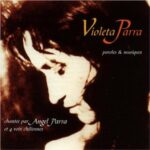 Songs of Violeta Parra (1997)
Songs of Violeta Parra (1997)
Hear the songs of Guillermo Calderón’s native Chile with folk legend Violeta Parra. With hits such as “Volver a los Diecisiete” (“To Be Seventeen Again”), Parra served as an intersection between the traditional folk music of Chile and modern pop music of her generation.
Symphony No. 11 in G minor (Opus 103; subtitled The Year 1905) (1957) 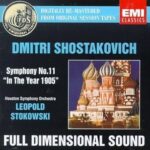
Inspired by the Russian Revolution of 1905, Dmitri Shostakovich followed up his Leningrad Symphony with another instant success. The first movement, “The Palace Square,” slowly builds anticipation with eerily quiet strings and ominous-sounding percussion. The second movement entitled “The 9th of January,” echoes the events of Bloody Sunday, building harsh climaxes with shrill flutes while drums launch like gunfire and the low brass provide unsettling dissonance. The piece ends with “Eternal Memory” and “Tocsin,” which are first reserved to allow for reflection of the dead, but then escalate to the confusion of battle sounds once more.
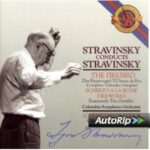 Stravinsky Conducts Stravinsky: Firebird-Complete / Scherzo a la Russe / Fireworks / Scherzo fantastique (1990)
Stravinsky Conducts Stravinsky: Firebird-Complete / Scherzo a la Russe / Fireworks / Scherzo fantastique (1990)
In the aftermath of the Russian Revolution, Stravinsky made his rise to fame for his classical compositions. Listen to the Columbia Symphony Orchestra bring the highlights of his career to life, with all of the movements from The Firebird, Scherzo a la Russe, Fireworks and Scherzo fantastique, conducted by Stravinsky himself. Explore how Stravinsky translated his joy from starting a family into these dynamic, lively and compelling orchestral pieces.


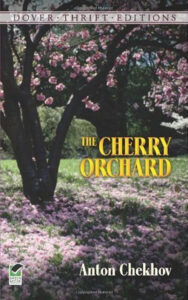



Leave a Reply